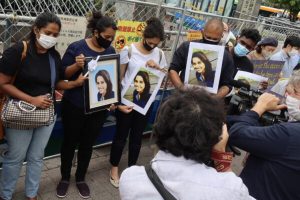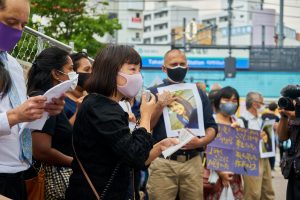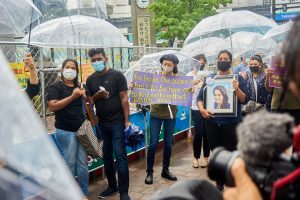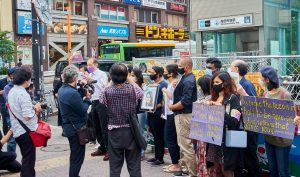
SNA (Tokyo) — During a May 30 demonstration in front of central Tokyo’s JR Takadanobaba Station, my labor union, Tozen Union, called upon the Japanese government to overhaul its immigration system and to protect the human rights of foreigners.
We persisted despite a heavy downpour, joined by the two younger sisters of Wishma Sandamali, a 33-year-old Sri Lankan woman who died after medical neglect in a Nagoya immigration detention center.
Wayomi Rathnayake called on the Immigration Bureau to release all video, documents, and information related to her sister’s death. Japan’s immigration bureaucracy has a history of opacity and arbitrary treatment of foreigners. We demanded that the government guarantee foreigners’ right to life, regardless of visa status. We must not accept valuing some lives less than others, due to flukes of fate that determine citizenship and residence status.
Foreign residents make up about 13% of Shinjuku residents, and Takadanobaba is home to many of them. Despite government denials, Japan has already become a nation of multiple nationalities and ethnicities.
The coronavirus pandemic has hit us all hard, many of us losing jobs, others closing their stores and businesses. Leaders are tasked with protecting the right to life of all people living in Japan against such widespread social hardship.
Amid the ongoing crisis, the ruling Liberal Democratic Party tried to change the Immigration Control Act to worsen the situation for asylum seekers and undocumented foreigners. The government tried to draw a clear line between two groups of people and divide them into Us and Them.

Japan’s immigration law and policies have little to do with the generally accepted concept of rule of law. Immigration officials can, as the Japanese saying goes, “boil or roast” foreigners at whim (nite-mo jiyu, yaite-mo jiyu), meaning do whatever they want to them.
Wishma had made countless requests for medical care and hospitalization while in the Nagoya detention center. Immigration officials ignored her calls and suggested she might be faking her illness. She died without being shown a shred of human decency.
She should not have been incarcerated in the first place. She should have been treated as a person unable to pay her school tuition and as a victim of domestic violence. She should have been given shelter and welfare. Lots of “shoulds,” but it’s too late for her now.

Immigration authorities treated her as a criminal. This issue goes well beyond Wishma’s individual case. Even today, throughout Japan, foreigners are suffering open-ended detention in immigration facilities. We don’t know when a second or third Wishma will emerge, but can know that if nothing changes they will.
Japan does not extend suffrage to foreigners, even those born and raised in Japan who know no other country. They are subject to the laws and policies decided by the government, yet they have no say in choosing that government. This violates the core tenet of democracy, which surely requires those subject to the laws to decide those laws.
In this sense, we Japanese must consider immigration to be an issue for Japanese as well as foreign people. A society that allows anyone’s human rights to be trampled upon is one that does not guarantee human rights. It’s high time we devised an immigration policy that protects real democracy, the rule of law, and human rights.

This article was written by Hifumi Okunuki, and originally published by the Shingetsu News Agency (SNA).
